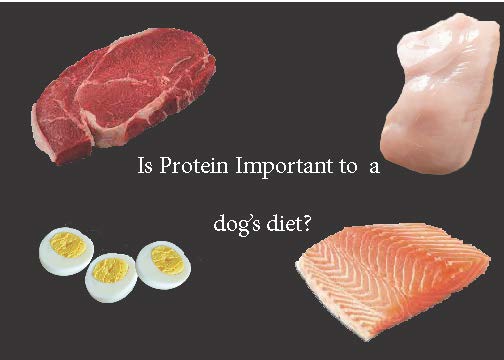Is Protein important?
Protein is very important for our dog’s health. Our dog’s bodies are made of protein- muscles, organs, hormones and enzymes and protein is critical for normal function. Dog’s use protein to maintain and repair cells and other tissue, which can consist of skin, muscle, bone and hair. Protein is also vital to helping support the immune system and it aids in making hormones, antibodies and enzymes.
Dog’s use protein for energy
Our dog’s use protein for energy- When our dog’s eats protein, it’s body breaks down the protein into amino acids and those amino acids is what the dog uses for energy.
Protein supplies amino acids
Protein are made of amino acids and dogs need 22 amino acids to make necessary proteins. The dog uses the amino acids to build hair, skin, muscles, nails, tendons, ligaments and cartilage. The amino acids also help with hormone production. A dog’s body can make about half of the amino acids itself, but they must get the rest from the food that they eat everyday. These amino acids are called essential amino acids because they are extremely important. If your dog has a deficiency of any of the essential amino acids, over time it can lead to health problems.
Where should my dog get protein?
Dog’s can get protein from animal sources, plant sources or a combination of both of these. Usually high-quality animal sources provide all the essential amino acids your dog needs, but a plant-based protein might not contain enough of some essential amino acids. Dog’s are considered carnivores and should be fed as such to fulfill their specific nutritional needs. Animal-based protein sources that should be fed to your dog and are often found in your dog’s food are: chicken, lamb, fish and beef.
Where else can my dog get protein?
Your dog can also get protein from eggs, dairy products, some types of grains and legumes. Dog’s cannot store protein so it must have a daily supply.
How much protein will my dog need?
Different dogs need different amounts of protein. Your dog’s age and activity level will depend on how much protein it needs daily. Dog’s that work hard or are very active need more protein than a dog that sleeps most of the day. Larger Dog’s will need more protein that a smaller breed of dog. Dog’s that are pregnant or lactating will need more protein in their diet. Also, a dog that has been sick or injured will need more protein for a successful recovery. Protein is also a necessity in a dog’s diet, but as dog’s age, a dog doesn’t require as much protein.
What if my dog gets too much or too little protein?
If a dog gets more protein than its body needs, the excess protein will be disposed of through the urine. If a dog is not getting enough protein over a period of time, it may shows signs of weakness, weight loss or a dull-looking coat.
Where can I find the percentage of protein?
You can find out how much the percentage of protein in your dog’s food by looking at the guaranteed analysis on the back of the bag. A high percentage is sometimes deceiving because different sources of protein in the dog food might not be completely digestible.
Look at the first few ingredients on the dog food bag to find the protein sources. Look for chicken, beef, eggs, lamb, fish, etc… Most high quality dog foods will have one or two protein sources listed in the first few ingredients and will have a percentage of about 20-25 percent crude protein.
Appearance is important
Ask your vet about the protein in your dog’s food, especially if you are worried he is not getting enough. The way your dog looks and acts is a good indication as to how good his diet is. If your dog is eating well, if his coat is shiny, if his eyes are bright and is he is active, that’s a pretty good indication he is getting the nutrition he needs.
https://www.petmd.com/dog/nutrition/the_power_of_protein
Until next time,
Hugs and Pug Kisses,
Candy
